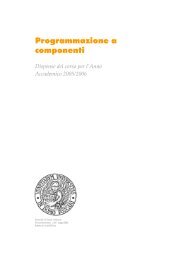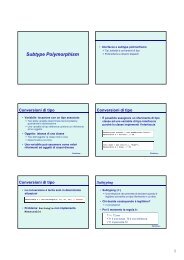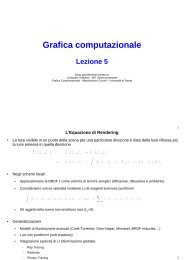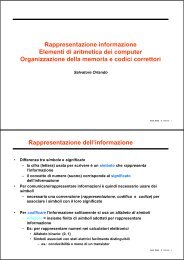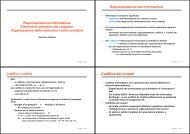Foscari - Dipartimento di Scienze Ambientali, Informatica e Statistica
Foscari - Dipartimento di Scienze Ambientali, Informatica e Statistica
Foscari - Dipartimento di Scienze Ambientali, Informatica e Statistica
Create successful ePaper yourself
Turn your PDF publications into a flip-book with our unique Google optimized e-Paper software.
A generation of ‘multitasking’ children are living their daily lives – inclu<strong>di</strong>ng eating and falling asleep<br />
– to the accompaniment of television, accor<strong>di</strong>ng to a survey of young people’s me<strong>di</strong>a habits. They<br />
watch TV before they go to school, when they return home, as they eat their evening meal and then –<br />
for 63%, a much higher percentage than read a book each day – in bed at night. The survey of five to<br />
16-year-olds shows that four out of five children now have a TV set in their bedroom.<br />
Television has become so widespread that many children now combine it with other activities,<br />
inclu<strong>di</strong>ng social networking online, looking from their laptop to the TV screen and back again. Even if<br />
they are concentrating on the television, young people are now unwilling to watch just one programme,<br />
with boys in particular often switching between channels to keep up with two programmes at the same<br />
time. The survey, conducted by the market research agency Childwise, will increase worries that<br />
childhood is increasingly about private space and sedentary activities and less about play, social<br />
interaction or the child’s own imagination.<br />
The government’s recent Children’s Plan focused on improving play facilities as a means of ensuring a<br />
more balanced life for young people who spend a lot of time watching television. Today’s survey<br />
fin<strong>di</strong>ngs show that after declining for three years, television-watching among children is now<br />
increasing again. This is mainly the result of more girls watching soap operas.<br />
Internet use is also continuing to increase rapidly. This means British children spend an average of five<br />
hours and 20 minutes in front of a screen a day, up from four hours and 40 minutes five years ago.<br />
Rea<strong>di</strong>ng books for pleasure, on the other hand, continues to decline as a regular pastime. While four out<br />
of five children read books in their own time, only a quarter do so daily and 53% at least once a week.<br />
The report, based on interviews with 1,147 children in 60 schools around England, Scotland and Wales,<br />
found television viewing now averages 2.6 hours a day across the age group, though one in ten say they<br />
watch more than four hours daily. The survey, which has been conducted annually for 14 years, asked<br />
for the first time whether children watched television while eating <strong>di</strong>nner or in bed before going to<br />
sleep. It found that 58% watch during their evening meal, while 63% lie in bed watching the screen<br />
(rising to almost 75% of 13 to 16-year-olds). Two-thirds – particularly the youngest children – watch<br />
before school, and 83% turn on the television after returning home.<br />
Rosemary Duff, Childwise research <strong>di</strong>rector, said television was now “a part of children’s lives”, but<br />
added that the quality of viewing had changed. “People used to pay more attention when they watched<br />
television. It used to be less widespread but much higher in its importance. Now it is widespread but<br />
just part of the background, not just at home but wherever you go.”<br />
“It seems that children now multitask, keeping one eye on the television as they flick through<br />
magazines or use the computer,” Duff added. When the company asked boys to choose between<br />
programmes on <strong>di</strong>fferent channels they often refused, saying they would ‘watch both’. “They switch<br />
from one to another and cannot imagine that they should have to make a decision. They are surprised<br />
that you should put them in a situation where they have to make a choice.”<br />
Computers are also now a key part of children’s private worlds. “The Internet is now an essential part<br />
of most young people’s lives,” says the study, with 85% of five to 16-year-olds using the Internet, and<br />
over a third (inclu<strong>di</strong>ng a quarter of five to six-year-olds) owning a computer or laptop of their own. On<br />
average, they go online just over four times a week, spen<strong>di</strong>ng two hours each time.<br />
26



